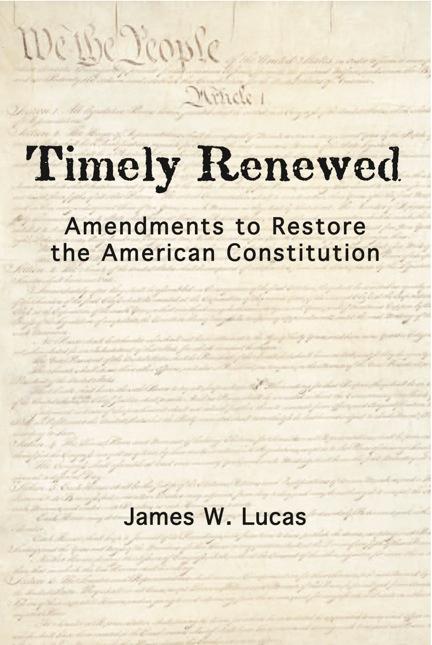Wisconsin Pro Publica and some regional newspapers have just published a lengthy report on a new push to amend the U. S. Constitution through the call of a convention under Article V. This Article, which governs how the Constitution is amended, provides that Congress should call a convention to propose amendments “on the Application of . . . → Read More: Can Congress be Compelled to Call a Constitutional Convention?
|
|||||
|
Our current winner-takes-all Electoral College system for electing our President is not what the Framers intended. However, direct popular election risks tearing apart our already divided nation. Fifty States, Not Six proposes a bipartisan solution which accommodates both Democrats and Republicans and assures that every citizen’s vote counts. . . . → Read More: Fifty States, Not Six – Reforming the Election Process Even with the most extensive Republican control of state legislatures in almost a century, constitutional conservatives still fall short of the 34 states needed to call an Article Five Convention of the States. Americans seeking to restore the constitutional balance between state and federal power would be well served to also promote reform of Article Five itself to eliminate the requirement that the states go through the archaic and unworkable mechanism of a convention in order to initiate amendments to the Constitution. . . . → Read More: Amending the Constitution to Constrain Federal Power: There Is An Alternative to a Doomed Convention of the States Mark Levin has directed attention to the use of the amendment power to restore constitutional government. However, the use of a state-called convention to accomplish this is very problematic from a procedural point of view, let alone concerns for a “runaway” convention. The better approach is to first adopt Levin’s and others’ suggestion that we amend Article V to permit states to initiate amendments without having to go through a convention. . . . → Read More: A Convention To Implement the Liberty Amendments? Rather than justifying a free-for-all of constiutional disobedience as recently advocated by Professor Louis Seidman, we should use the amendment process to update the Constitution if needed. And if amendment is too difficult, let’s reform it to allow constitutional change to proceed in a democratic and orderly manner. . . . → Read More: Let’s Not Give Up on the Constitution – Amendment Is a Better Solution The Gay Marriage Cases Are Not About Gay Marriage: The Issue Is Survival of Government by The PeopleThe gay marriage cases before the Supreme Court represent a classic example of judges twisting constitutional language to impose their personal policy views on the nation. There is no basis in any constitutional language for forcing gay marriage on the nation, regardless of its possible merits as social policy. If these merits are so persuasive that gay marriage belongs in the Constitution, the solution is not the anti-democratic process of forcing it on the nation through judicial dictate. The solution is the democratic process of amendment. If amendment is too difficult, let us preserve democratic rule by modest reforms of the amendment process such as the Amendment Amendment, not by continuing our current system of judicial imperialism. . . . → Read More: The Gay Marriage Cases Are Not About Gay Marriage: The Issue Is Survival of Government by The People The new short book Are We The People? shows how we can revive the amendment process so that major constitutional issues can be decided by the democratic method the Framers intended rather than by the fiat of an unelected and unaccountable judicidary. . . . → Read More: Are We The People? is now available – the answer to SCOTUSocracy Professor Sanford Levinson’s recent New York Times op-ed on our “imbecilic” Constitution gets only one thing right – the amendment process is moribund. Professor Richard Epstein’s brilliant response to Levinson gets only one thing wrong – limited government will not be restored voluntarily by regular politicians no matter well schooled they are by Professor Epstein. We need a tool to overcome 80 plus years of Supreme Court decisions underlying the federal leviathan. That tool is a reformed amendment process enabling constitutional amendments to be initiated and enacted at the state level without having to go through either Congress or the dangerous process of a second constitutional convention. . . . → Read More: Professor Levinson and the “Imbecilic” Constitution: Speaking Liberty to Power Even if the Supreme Court rules Obamacare unconstitutional, that will still leave in place all of the previous 75 years of Supreme Court decisions which have allowed the federal government to expand far beyond its original constitutional limits. In the 1930s, the Supreme Court overturned many New Deal expansions of federal power, only to have them all reversed as Roosevelt appointees eventually filled the Court. A Supreme Court decision against Obamacare must not be a cause for complacency in the war against the ever-expanidng power of the national government, including enacting amendments to restore the original constitutional limits on federal power. . . . → Read More: Obamacare: Winning the Battle but Losing the War? |
|||||
|
Copyright © 2026 Timely Renewed - All Rights Reserved |
|||||



The Missing Half of Originalism
By framing the fundamental issue as judicial amendment vs. democratic amendment, originalists can make clear that they are defending democratic government, not the dead hand of history as portrayed so often by their opponents. However, unlike regular laws, which can be readily amended by current legislatures, the Constitution can only be democratically changed by the lugubrious procedures of Article V. Therefore, originalists need to actively advocate reform of Article V. . . . → Read More: The Missing Half of Originalism